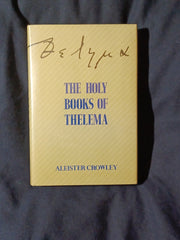Spiritual Heritage of India by Swami Prabhavananda. 1st U.S. edition. Inscribed by Swami Prabhavananda
The Spiritual Heritage of India by Swami Prabhavananda. Doubleday & Company, Inc. 1963. (I assume this is the first American edition. On copyright page, "First published in the U.S. 1963" stated with no listing of later printings. Inscribed, "For (previous owner)/ With- affectionate greetings/ from/ Swami Prabhavananda/ St Louis/ May 1- '66". 4 3/4" x 8 1/2" 374 pages Hardcover with dust jacket. DUST JACKET: Heavy wear with small chips to the top and bottom of the spine and dj joints. A 3/4" rough tear on the bottom of the front panel. Not price-clipped. Now protected by a removable mylar dj cover. BOOK: Moderate cover edge wear. Some dust soiling on the edges of the page block. A blue felt tip pen streak on the top edge of the page block. A 1/4" diameter stain on the leading edge of the page block. Some separation inside the front cover. Otherwise, no previous owner markings. No tears, folds or creases to pages. Binding is tight with no looseness to pages. Not ex-library, not remaindered and not a facsimile reprint. For sale by Jon Wobber, bookseller since 1978. IG12a
"Swami Prabhavananda (December 26, 1893 – July 4, 1976) was an Indian philosopher, monk of the Ramakrishna Order, and religious teacher. He moved to America in 1923 to take up the role of assistant minister in the San Francisco Vedanta Society. In 1928 he was the minister of a small group in Portland, OR, but in 1930 he founded the Vedanta Society of Southern California. The Swami spent the rest of his life there, writing and collaborating with some of the most distinguished authors and intellectuals of the time, including Aldous Huxley, Christopher Isherwood, and Gerald Heard.
Prabhavananda's book The Spiritual Heritage of India was reviewed in the academic journal Philosophy. The review stated that "Swami Prabhavananda has written a charming and authoritative book on the spiritual heritage of India, by which he means that heritage in consonance with the Vedic tradition and its culmination in Vedanta" (p. 376).[10] The reviewer stated that "throughout the book breathes an air of relaxed simplicity and conviction.... I was particularly refreshed by the absence of attacks on science, materialism, naturalism, and other such means to spiritual fulfilment" " - Wikipedia
"Swami Prabhavananda (December 26, 1893 – July 4, 1976) was an Indian philosopher, monk of the Ramakrishna Order, and religious teacher. He moved to America in 1923 to take up the role of assistant minister in the San Francisco Vedanta Society. In 1928 he was the minister of a small group in Portland, OR, but in 1930 he founded the Vedanta Society of Southern California. The Swami spent the rest of his life there, writing and collaborating with some of the most distinguished authors and intellectuals of the time, including Aldous Huxley, Christopher Isherwood, and Gerald Heard.
Prabhavananda's book The Spiritual Heritage of India was reviewed in the academic journal Philosophy. The review stated that "Swami Prabhavananda has written a charming and authoritative book on the spiritual heritage of India, by which he means that heritage in consonance with the Vedic tradition and its culmination in Vedanta" (p. 376).[10] The reviewer stated that "throughout the book breathes an air of relaxed simplicity and conviction.... I was particularly refreshed by the absence of attacks on science, materialism, naturalism, and other such means to spiritual fulfilment" " - Wikipedia













